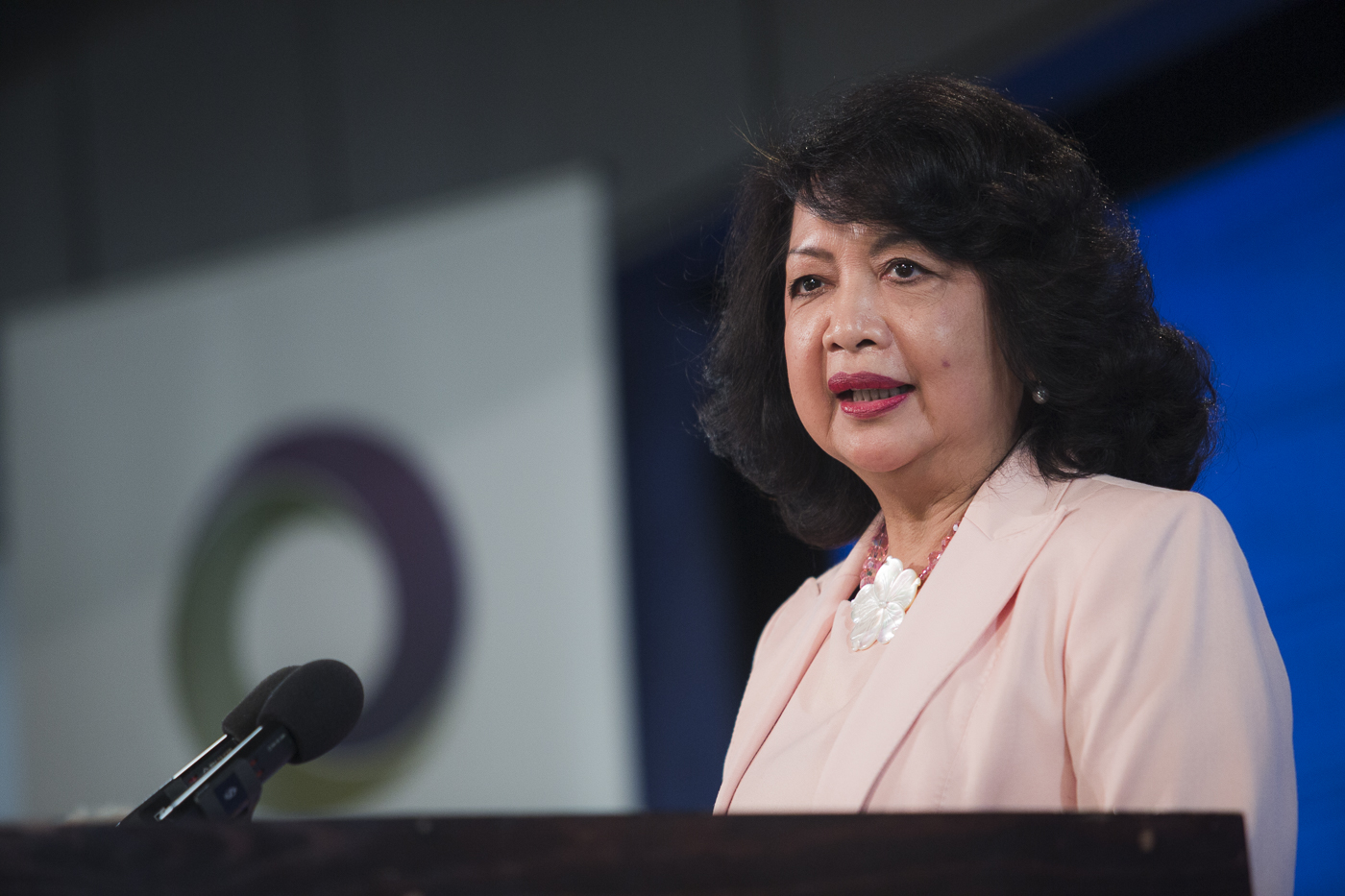In what ABC moderator, Sabra Lane, called a “cracker of a speech”, Irene Natividad, President of the Global Summit of Women, charmed her National Press Club audience during Wednesday’s live ABC broadcast with bold provocation. To all those women who say they don’t want to reach leadership positions through mandatory gender quotas, her advice was blunt: “Get over it!’. She was unequivocal in her support for pro-active policy. “Quotas accelerate women’s access (to leadership)” she said. “They increase demand for qualified women.”
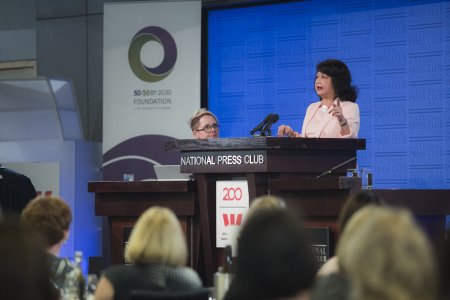
… global leaders should not underestimate the “magnitude of collective action”
Natividad’s address, titled Are we there yet? A Global Look at Women’s Journey to Leadership, spoke of an urgent need for women to hold the reins of power in much greater numbers, across every sector and at every level of leadership.
She opened with a moving account of the 2016 Women’s March in Washington. A veteran of protest marches, from civil rights to anti-Vietnam, Natividad said this was the largest single day of protest the United States has ever seen. “Where was the front of the march? We couldn’t see it. And it didn’t matter. People were coming from everywhere.” What’s more, it wasn’t a ‘single march’, but rather a global collective in which citizens across 82 nations participated. Natividad warned that global leaders should not underestimate the “magnitude of collective action”. (For more on the Women’s March movement see BroadAgenda’s 2017 IWD Interview with Prof Simone Chambers).
 (Virginia Haussegger AM, Dir 50/50 Foundation; Dame Quentin Bryce, Patron 50/50 Foundation; Fran Murphy, BAE Systems; Irene Natividad, Pres Global Summit of Women; Dr Gordon de Brouwer, 50/50 Foundation Advisory Council; Adj Prof Carmel McGregor PSM, 50/50 Foundation Steering Committee. Photo by Hilary Wardhaugh)
(Virginia Haussegger AM, Dir 50/50 Foundation; Dame Quentin Bryce, Patron 50/50 Foundation; Fran Murphy, BAE Systems; Irene Natividad, Pres Global Summit of Women; Dr Gordon de Brouwer, 50/50 Foundation Advisory Council; Adj Prof Carmel McGregor PSM, 50/50 Foundation Steering Committee. Photo by Hilary Wardhaugh)
“Change doesn’t happen without pressure,” she said, “There is security and courage in numbers.”
Natividad spoke of the current energy that is propelling public action by women from all walks of life, such as that demonstrated through the #MeToo campaign. “Change doesn’t happen without pressure,” she said, “There is security and courage in numbers.”
However, she was quick to remind the audience that women have always spoken out. But, according to Natividad, “the difference this time is that the world is listening”. So the big question now, she said, is quite simply, “What are we going to do with all this energy?”
“Why is this happening now? And why is the cost of women speaking out so high?
Then, with a finger on the pulse of the zeitgeist, Natividad immediately shook any comfort or complacency that may have been settling in the minds of her listeners by posing the hard questions, suggesting we need to ask, “Why is this happening now? And why is the cost of women speaking out so high?” In describing the current climate of gender relations and a brewing mood of antagonism, Natividad said she was concerned “This is a very awkward moment that can lead to backlash”.
“Marches don’t change the fabric of women’s daily lives,” she said, insisting that a stronger, collective effort is needed to increase the representation of women in positions of political leadership. In Natividad’s world view, ultimately, gender equality will only be achieved through the global economic and political empowerment of women.
“I often say that women are like immigrants to the world of work,” she said. “It is a world not of our making.”
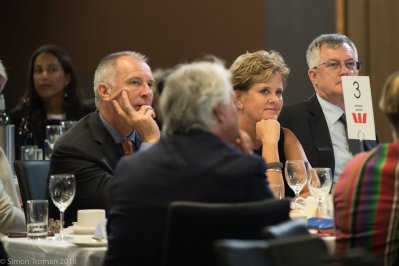
The key focus for women’s empowerment, according to Natividad, must be the workplace. “I often say that women are like immigrants to the world of work,” she said. “It is a world not of our making.” To succeed in the workforce she believes women are expected to learn to inhabit a system and space that has been created by men, for men: one that relies on women doing the bulk of unpaid domestic work in the household.
Yet despite entrenched inequality in the workforce, Natividad points out that gender diversity in leadership teams has a direct correlation with improved performance outcomes and bottom line revenues: a fact that has been repeatedly argued.
“How many more studies do we need?
“How many more studies do we need?” she asked, referencing the over 70 global studies that have proven that companies with gender diversity on their boards and in their executive teams have higher profit outcomes.
So how to get more women into those leadership teams? Once again, it’s a no brainer according to Natividad: an obvious answer is – quotas. Such quotas, she argued, are necessary to embed gender equality into business practice.
To that end, Natividad was full of praise for Australia’s position as a “world leader” when it comes to insisting on gender diversity in publicly listed companies, by making gender measurements an ASX listing requirement.
… she also had some sharp and salient advice to governments – make women-led businesses a feature of the government supply chain.

(Photo: Felicity Duffy, Head Women’s Markets, Westpac Group; Mark Kenny, Fairfax National Affairs Editor)
Following her address there was no shortage of questions from the press club audience. The first came from BroadAgenda’s Editor-In-Chief and Director of the 50/50 by 2030 Foundation, Virginia Haussegger, who asked why female-owned and run companies struggle to secure investment from venture capitalists. In answer Natividad focused on the need to change the corporate cultural bias against backing women.
But she also had some sharp and salient advice to governments – make women-led businesses a feature of the government supply chain. Insisting on gender diversity and support for women in government procurement is an obvious and “easy” action, according to Natividad. As she pointed out, it doesn’t require legislation and new laws – just smart leadership. And it can make a world of difference to the growth and sustainability of women founded and women led business operations.
In response to a question from Misha Schubert, Board Director of the National Press Club, on why Hilary Clinton wasn’t successful in the 2016 American presidential election, Ms Natividad cited misogyny and a lack of female role models as key factors affecting voters. “If you can’t see role models, you can’t be it,” she said, noting that grassroots activism currently taking place in the US to engage female voters and increase the number of women standing in local elections is gaining traction.
Finally, Natividad closed her remarks with advice to young women to “have courage”, and to not shy away from the hard work of gaining experience to ultimately lead change in the future.
To view Irene Natividad’s NPC address visit ABC’s iView.
 (Photo: Felicity Duffy, Head Women’s Markets, Westpac Group; Irene Natividad, Pres Global Summit of Women; Lyn Lewis-Smith, CEO Business Events Sydney)
(Photo: Felicity Duffy, Head Women’s Markets, Westpac Group; Irene Natividad, Pres Global Summit of Women; Lyn Lewis-Smith, CEO Business Events Sydney)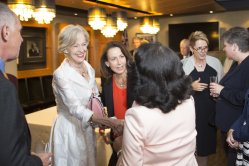
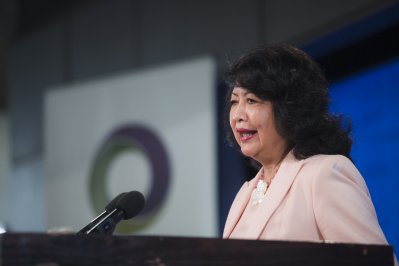
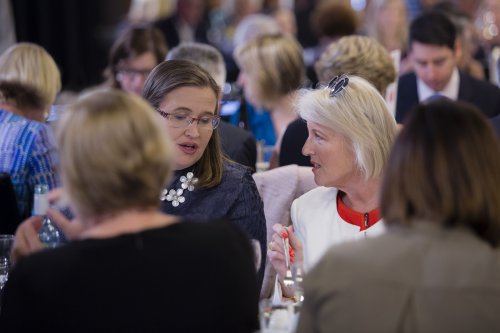 (Photo: Kate Jenkins, Sex-Discrimination Commissioner; Libby Lyons, Dir WGEA)
(Photo: Kate Jenkins, Sex-Discrimination Commissioner; Libby Lyons, Dir WGEA) (Photo: Kate Jenkins, Sex-Discrimination Commissioner; Her Excellency Menna Rawlings CMG; Ann Sherry, Co-Chair Global Summit of Women Host Committee; Virginia Haussegger, Dir 50/50 by 2030 Foundation)
(Photo: Kate Jenkins, Sex-Discrimination Commissioner; Her Excellency Menna Rawlings CMG; Ann Sherry, Co-Chair Global Summit of Women Host Committee; Virginia Haussegger, Dir 50/50 by 2030 Foundation) (Photo: Virginia Haussegger, Dir 50/50 by 2030 Foundation; Sabra Lane, President National Press Club)
(Photo: Virginia Haussegger, Dir 50/50 by 2030 Foundation; Sabra Lane, President National Press Club)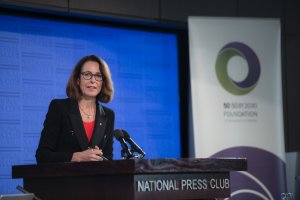
(Photo: Virginia Haussegger, Dir 50/50 by 2030 Foundation)
To view Irene Natividad’s NPC address visit ABC’s iView.
